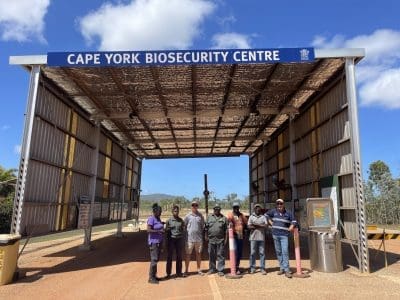A Queensland Government move to close Cape York Biosecurity Centre will leave Australia exposed to a potentially “catastrophic” risk of disease, farm group AgForce has warned.
The decision to close the centre was included as part of a $3.7 million Far Northern Biosecurity Initiative (FNBI) over five years announced yesterday.
The Government statement said the initiative is designed to ensure the Torres Strait and Cape York Peninsula are prepared for biosecurity threats.
It says reforms will mean more biosecurity surveillance across the Cape, with plans already in place to continue working with industry to achieve this.
The announcement includes confirmation that the Cape York Biosecurity Centre (CYBC) at Coen will be closed on June 30.
“However there will be a broader staff presence across Cape York and the Torres Strait,” it says.
“Even with these changes taken into account, Biosecurity Queensland has increased the number of its personnel in the Far North compared to this time last year.”
Biosecurity Queensland’s commitment to the front lines of Cape York biosecurity included the appointment of new team members in Bamaga and Thursday Island over the last 12 months.
Queensland Chief Biosecurity Officer Rachel Chay said successful biosecurity systems relied on constant re-evaluation of how we best protect Queensland from emerging biosecurity risks.
“That means building and expanding partnerships with industry, with local governments and with community organisations,” Dr Chay said.
“Our significant investment in biosecurity programs in Far North Queensland shows we are serious about protecting our agricultural industries.
“No Australian state faces more biosecurity threats than Queensland, and we know that Far North Queensland’s geographical position puts it at the front line.
“These modernized biosecurity approaches mean Far North Queensland is well prepared to identify and deal with threats.”
“Dangerous move”: AgForce
However farming organisation AgForce has called on the government to urgently reconsider its decision, amid fears it is leaving the country defenceless to attack from disease and pests, including an incursion of foot and mouth disease or lumpy skin disease.
AgForce CEO Michael Guerin said removing the physical checkpoint between Papua New Guinea and Far North Queensland was “a dangerous move”.
“It is simply madness to close this facility,” he said.
“At this point in time, with FMD and LSD biosecurity incidents in Indonesia, African Swine Fever in Papua New Guinea, plus vectors that could come down the Cape from Papua New Guinea, it makes absolutely zero sense.
“Without a solid movement control checkpoint in Cape York, an emergency animal disease outbreak on one of the Torres Strait Islands could have a catastrophic impact on red meat exports from Australia.”
He siad the closure left DAF without infrastructure north of Mareeba to mount an emergency disease or pest response, and only two DAF biosecurity officers north of Cairns – one at Bamaga and one on Thursday Island.
“Ultimately, without a solid line of defence up north, the country has lost the ability to prevent a pest or disease from spreading,” Mr Guerin added.
In previous years, the Cape York Biosecurity Centre was involved in the successful eradication of the papaya fruit fly from north Queensland, and has increased biosecurity awareness amongst travellers on the sole road to the Cape.
Mr Guerin said: “There are repeated reports of northbound visitors stopping to get biosecurity information from a DAF officer and the pleasing response of people doing the right thing by surrendering produce to the biosecurity bins on their return journey.
“Those benefits are hard to measure, but they are real, and they will disappear when the Cape York Biosecurity Centre closes and infrastructure is dismantled.
“Unconfirmed reports suggest that the facility is on indigenous land and this is partly the reason why it needs to close, but surely an agreement could be worked out with the local community to retain this essential service and protect Queensland’s biosecurity?”
Dr Chay said Biosecurity Queensland was investing heavily to protect the agricultural industries vital to jobs and the economy of the Far North.
“Over the next five years, $3.7 million will be invested into the Far Northern Biosecurity Initiative (FNBI) which will have a strong emphasis on stakeholder empowerment, education, and partnership,” she said.
“The FNBI is changing the way biosecurity services are delivered in the region, allowing more efficient and effective management options than the inspection focused model employed at the CYBC.”
Dr Chay said Biosecurity Queensland will continue working with key stakeholders to build on the partnerships already achieved across Far North Queensland.
“With the limited number of vehicles stopping at CYBC, there are more contemporary and effective ways of delivering biosecurity services,” she said.
“In 2021 only 40 per cent of almost 30,000 southbound vehicles were inspected at the Coen facility.
“An estimated 90,000 people visit the Northern Peninsula Area each year, mostly from May to November.”
The CYBC was established over 20 years ago following detection of spiralling whitefly in Cape York.
The new partnership approach has already led to a range of joint surveillance activities on Cape York Peninsula to track the spread of pests and diseases.
Biosecurity is respectful of the Native Title claim on the site of the existing Coen facility and looks forward to this being finalised for a fair outcome.
Biosecurity is everybody’s responsibility. Biosecurity Queensland remains committed to providing quality biosecurity services in Far North Queensland, and to helping the public and stakeholders to meet their biosecurity responsibilities.
Sources: Qld Government, AgForce




HAVE YOUR SAY